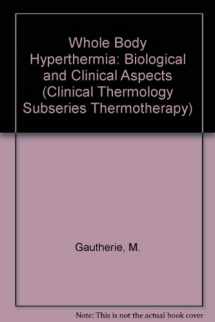
Whole Body Hyperthermia: Biological and Clinical Aspects (CLINICAL THERMOLOGY SUBSERIES THERMOTHERAPY)
ISBN-13:
9780387545608
ISBN-10:
0387545603
Author:
M. Gautherie, H. I. Robins, J. D. Cohen, A. J. Neville
Publication date:
1992
Publisher:
Springer Verlag
Format:
Hardcover
84 pages
FREE US shipping
Book details
ISBN-13:
9780387545608
ISBN-10:
0387545603
Author:
M. Gautherie, H. I. Robins, J. D. Cohen, A. J. Neville
Publication date:
1992
Publisher:
Springer Verlag
Format:
Hardcover
84 pages
Summary
Whole Body Hyperthermia: Biological and Clinical Aspects (CLINICAL THERMOLOGY SUBSERIES THERMOTHERAPY) (ISBN-13: 9780387545608 and ISBN-10: 0387545603), written by authors
M. Gautherie, H. I. Robins, J. D. Cohen, A. J. Neville, was published by Springer Verlag in 1992.
With an overall rating of 4.4 stars, it's a notable title among other
books. You can easily purchase or rent Whole Body Hyperthermia: Biological and Clinical Aspects (CLINICAL THERMOLOGY SUBSERIES THERMOTHERAPY) (Hardcover) from BooksRun,
along with many other new and used
books
and textbooks.
And, if you're looking to sell your copy, our current buyback offer is $0.3.
Description
1. 1 Background neoplastic diseases which are currently refractory to conventional therapy. All aspects of both preclinical Anticancer effects of elevated (noncauterizing) tem and clinical WBH, ranging from molecular biology perature were first observed in ancient Egyptian times and physiology to WBH methodologies and clinical (Oleson and Dewhirst 1983). Hippocrates trials, will be comprehensively reviewed. It is our in (460-377 B. C. ) later incorporated fever therapy into a tention to provide the reader with a definitive resource homeopathic approach to disease (Le. , treating a dis of to evaluate the current status and future potential ease with a symptom of that disease). In the fourth WBH. In so doing, we will attempt to present the vari century, Refus of Ephesus advocated the use of fever ous perspectives and insights derived from the efforts induction to treat malignant diseases (Kluger 1980). of investigators throughout the world. We hope this In the nineteenth century tumor regressions accompa will encourage an expanded investigative commitment nying high fevers were reported both by Busch and to this exciting and innovative approach to cancer Bruns (Busch 1866; Bruns 1888). At the end of the therapy.


We would LOVE it if you could help us and other readers by reviewing the book
Book review

Congratulations! We have received your book review.
{user}
{createdAt}
by {truncated_author}


